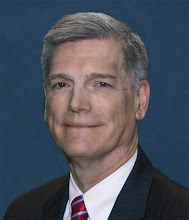 U.S. DOE Secretary Samuel Bodman spoke at DOE's Biomass Conference on April 18. In his prepared remarks the Secretary acknowledged concerns about corn-based ethanol and the importance of developing the "next generation" of ethanol made from biomass products that are outside the food chain:
U.S. DOE Secretary Samuel Bodman spoke at DOE's Biomass Conference on April 18. In his prepared remarks the Secretary acknowledged concerns about corn-based ethanol and the importance of developing the "next generation" of ethanol made from biomass products that are outside the food chain: In all areas of our research and development, the impact on our global environment – including the impact of energy diversification on land and water resources and world food supplies – is an important part of the discussion. And it is an important consideration in our technical research. This has absolutely been the case when it comes to biofuels.The Wall Street Journal's Environmental Capital blog describes Secretary Bodman's remarks as "astride the fence", midway between the view of some U.N. officials that producing biofuels is a "crime against humanity" and the view of Brazilian President Luiz Inacio Lula da Silva that denying the developing world alternative fuels would be the real crime.
We’ve looked at the research and we’ve concluded that a diverse, sustainable set of biofuels-technologies will measurably improve our energy security and the health of our environment.
But to do this we must develop, produce, deliver and consume biofuels in an intelligent way and with an urgent focus on sustainability.
So, as we pursue diversity in our overall energy mix we must also pursue diversity in our biofuels. This means moving away gradually from ethanol produced from food stocks like corn.
Let me be clear: I am not minimizing the importance of ethanol made from corn - it is critical to our energy security and America’s farmers make an important contribution to our energy security.
But what I am saying is that we need to develop and deploy the next generation of ethanol - ethanol and other products made from biomass products that are outside the food chain.
In my view, this means cellulosic fuels made from agricultural waste products and crops like switchgrass, which can be grown and regenerated on less desirable lands.
From our point of view, Secretary Bodman is right to focus on diversity in energy supply and to recognize that energy and environmental policies are inextricably linked. The Wall Street Journal's Environmental Capital blog reminds us that both are also linked to economic policy. That's why we favor producing copious amounts of reliable baseload electricity from an inedible, incombustible rock - uranium.

Comments